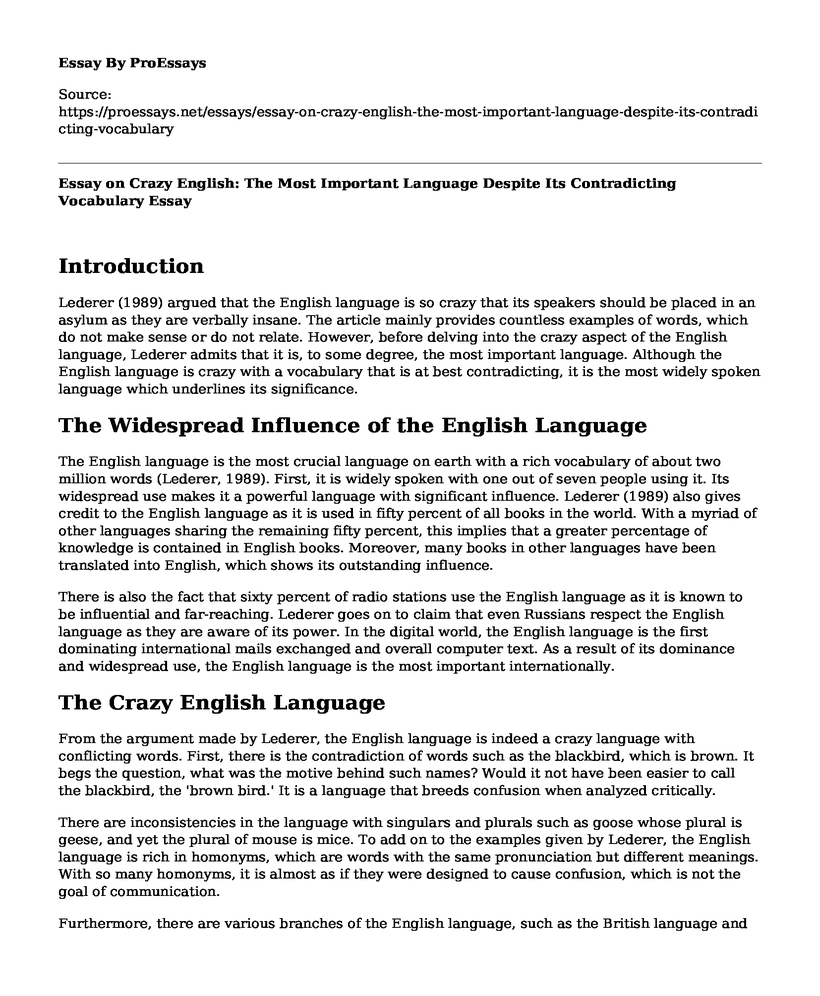Introduction
Lederer (1989) argued that the English language is so crazy that its speakers should be placed in an asylum as they are verbally insane. The article mainly provides countless examples of words, which do not make sense or do not relate. However, before delving into the crazy aspect of the English language, Lederer admits that it is, to some degree, the most important language. Although the English language is crazy with a vocabulary that is at best contradicting, it is the most widely spoken language which underlines its significance.
The Widespread Influence of the English Language
The English language is the most crucial language on earth with a rich vocabulary of about two million words (Lederer, 1989). First, it is widely spoken with one out of seven people using it. Its widespread use makes it a powerful language with significant influence. Lederer (1989) also gives credit to the English language as it is used in fifty percent of all books in the world. With a myriad of other languages sharing the remaining fifty percent, this implies that a greater percentage of knowledge is contained in English books. Moreover, many books in other languages have been translated into English, which shows its outstanding influence.
There is also the fact that sixty percent of radio stations use the English language as it is known to be influential and far-reaching. Lederer goes on to claim that even Russians respect the English language as they are aware of its power. In the digital world, the English language is the first dominating international mails exchanged and overall computer text. As a result of its dominance and widespread use, the English language is the most important internationally.
The Crazy English Language
From the argument made by Lederer, the English language is indeed a crazy language with conflicting words. First, there is the contradiction of words such as the blackbird, which is brown. It begs the question, what was the motive behind such names? Would it not have been easier to call the blackbird, the 'brown bird.' It is a language that breeds confusion when analyzed critically.
There are inconsistencies in the language with singulars and plurals such as goose whose plural is geese, and yet the plural of mouse is mice. To add on to the examples given by Lederer, the English language is rich in homonyms, which are words with the same pronunciation but different meanings. With so many homonyms, it is almost as if they were designed to cause confusion, which is not the goal of communication.
Furthermore, there are various branches of the English language, such as the British language and U.S. English. For instance, in the U.S, the word practice is both a verb and a noun. However, in the British language, practice is a noun, while 'practise' is a verb. For native speakers or at first glance, the English language may seem easy and normal, but for those who use it as a second language, they find it confusing or crazy, as Lederer suggests.
Conclusion
The English language, as Lederer argues, is a crazy language with inconsistencies that harbor confusion. There are rarely direct relationships between words and the objects they represent. The irony is in the fact that despite all these inconsistencies, the English language remains the most influential with widespread use. The solution thus lies in adapting to the craziness of the English language as it is the most powerful language.
Reference
Lederer, R. (1989). English is a Crazy Language.
Cite this page
Essay on Crazy English: The Most Important Language Despite Its Contradicting Vocabulary. (2023, Apr 08). Retrieved from https://proessays.net/essays/essay-on-crazy-english-the-most-important-language-despite-its-contradicting-vocabulary
If you are the original author of this essay and no longer wish to have it published on the ProEssays website, please click below to request its removal:
- "The Ocean at the End of the Lane" by Neil Gaiman Essay
- Critical Essay on "The Adventure of the Speckled Band" by Arthur Conan Doyle
- Hercules Essay Example
- The Fall of the House of Usher Analysis Paper Example
- Essay Sample on Similarities and Differences Between "The Bluest Eye" and "Eve's Bayou"
- Junot Diaz: From Santo Domingo to 'Drown' - Research Paper
- Essay Example on Young Man's Conflict: "A & P" by John Updike







